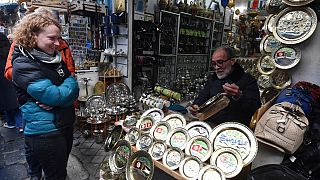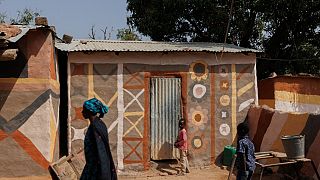Tunisia
The Carthage Theatre Days delighted theatre lovers in Tunisia during a 24th edition.
The JTC, as the event is locally known, is North Africa's biggest theatrical festival. It celebrated its 40th anniversary this year.
For the occasion, organizers set up a rich program. 64 shows from 28 African and Mena countries were presented in Tunis.
220 Logements which translates as 220 Housing Units is an Ivorian musical. It was one of 10 plays competing for the top prize.
"We were afraid, concern by our speed of speech because us, Ivorians, we speak rapidly, actress Asofi Eba confesses.
"We were wondering, would they understand what we say? At certain times we speak Nouchi, a language that is one the Cote d'Ivoire cultural identities."
"Despite all that, the Tunisian audience perfectly understood us. They reacted whenever it was the right to do so, remained silent when it was the right time as well," Eba shares.
The work by Chantal Djédjé was staged by Souleyman Sow. Choregrapher Hermann Nikoko was also part of the team.
220 Logements was one of 10 works competing for the top prize at the JTC.
It tells the troubled history of Cote d'Ivoire from the 1990's to the 2010 with charm and humour.
The 90s are crucial years in the history of the west African nation culturally, socially and politically. They were marked by events including the death of the country's first president Félix Houphouët Boigny, the theorization of the concept of Ivoirité or Ivorianness, the first coup d'état. It also touches on massive student protests and the zouglou dance and music style which expressed contestation.
"Multiples crises"
220 Logements explores the fates of residents of the housing units located in Adjamé, an inconic neighbourhood of Abidjan
"220 Logements was one of the first neighborhoods of Abidjan", director Souleymane Sow explains.
"Civil servants lived there, the first civil servants of Abidjan. They served as a starting point. We thought it was important to tell the history of Cote d'Ivoire, to show this greatness then the deconstruction that they had to undergo."
"Cote d'Ivoire has been through multiple crises, you know, devaluation, revolts, multi-party system, youth activism and power from the street," he concludes.
Actor Désiré Podé plays a retired civil servant. He says the musical can be therapeutic for the Ivorian society and help foster reconciliation.
“This play is truly topical. We always play to a full house as people are happy to come and watch the play. It is so good. People always ask us questions, there is debate.”
The 10-day JTC ended on December 10. The final part of the 220 trilogy is being created at the Abidjan's Fabrique Culturelle.













00:51
Marrakech national festival: honoring the legacy of popular arts
Go to video
First Malaria treatment for babies approved
02:20
Young designers grace the runway at Fashion Finest Africa’s show in Lagos
02:21
Ivorian diaspora in Paris demands free and inclusive elections ahead of October vote
00:50
Ons Jabeur retires from Wimbledon Opener due to breathing issues
00:00
Ivory Coast: Laurent Gbagbo and Tidjane Thiam's parties form a united opposition front